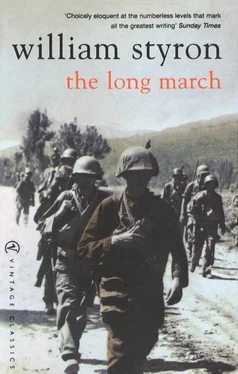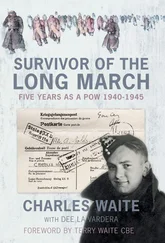William Styron - The Long March
Здесь есть возможность читать онлайн «William Styron - The Long March» весь текст электронной книги совершенно бесплатно (целиком полную версию без сокращений). В некоторых случаях можно слушать аудио, скачать через торрент в формате fb2 и присутствует краткое содержание. Город: New York, Год выпуска: 1952, ISBN: 1952, Издательство: Vintage Classics, Жанр: prose_military, на английском языке. Описание произведения, (предисловие) а так же отзывы посетителей доступны на портале библиотеки ЛибКат.
- Название:The Long March
- Автор:
- Издательство:Vintage Classics
- Жанр:
- Год:1952
- Город:New York
- ISBN:978-0099422792
- Рейтинг книги:3 / 5. Голосов: 1
-
Избранное:Добавить в избранное
- Отзывы:
-
Ваша оценка:
- 60
- 1
- 2
- 3
- 4
- 5
The Long March: краткое содержание, описание и аннотация
Предлагаем к чтению аннотацию, описание, краткое содержание или предисловие (зависит от того, что написал сам автор книги «The Long March»). Если вы не нашли необходимую информацию о книге — напишите в комментариях, мы постараемся отыскать её.
The Long March — читать онлайн бесплатно полную книгу (весь текст) целиком
Ниже представлен текст книги, разбитый по страницам. Система сохранения места последней прочитанной страницы, позволяет с удобством читать онлайн бесплатно книгу «The Long March», без необходимости каждый раз заново искать на чём Вы остановились. Поставьте закладку, и сможете в любой момент перейти на страницу, на которой закончили чтение.
Интервал:
Закладка:
“Yes, sir,” he heard the Major say, “we’ll be ahead of the game.” Culver made a calculation then; by the operations map, which he knew so well, that was three and a half miles—a mile farther than the regulation distance for an hour’s march. It was, indeed, like running. Pushing on through the sand, he felt a wave of hopelessness so giddy and so incomprehensible that it was almost like exhilaration —and he heard a noise—half-chuckle, half-groan—escape between his labored breaths. Three and a half miles: the distance from Greenwich Village almost to Harlem. In his mind he measured that giddy parade of city blocks, an exhausting voyage even on wheels. It was like twisting a knife in his side but he went on with the mental yardstick—to imagine himself plodding that stretch up the sandless, comfortably receptive pavements of Fifth Avenue, past Fourteenth Street and the bleak vistas of the Twenties and the Thirties, hurrying onward north by the Library, twenty blocks more to the Plaza, and pressing still onward along the green acres of the Park… his thoughts recoiled. Three and a half miles. In an hour. With more than thirty-two still to go. A vision of Mannix came swimming back; Culver stumbled along after the dauntless Colonel, thinking, Christ on a crutch.
They hastened on. Night had fallen around them, tropic and sudden, lit now, as they descended across a thicket of swampy ground, only by the lights of the jeep. Culver had regained his wind but already his chest and back were awash in sweat, and he was thirsty. He took a vague comfort in the fact that others felt the same way, for behind him he heard canteens being unsnapped from their cases, rattling out of their cups, and the noise, in mid-march, of drinking—a choked, gurgling sound—then, faint to the rear, Man-nix’s angry voice: “All right, goddammit, I told you people to hold onto your water! Put those goddam canteens back until the break!” Culver, craning his neck around, saw nothing —no Mannix, who had apparently dropped behind—nothing except a shadowy double line of men laboring through the sand, fading off far down the road into the general blackness. To the rear some marine made a joke, a remark; there was laughter and a snatch of song— on top of old Smo-oky, all covered
… Then Mannix’s voice again out of the dark: “O.K. you people can grabass all you want but I’m telling you you’d better save your wind. If you want to talk all the way it’s O.K. with me but you’re gonna crap out if you do, and remember what I said…” His tone had become terse and vicious; it could have been the sound of a satrap of Pharaoh, a galley master. It had the forbidding quality of a strand of barbed wire or a lash made of thorns, and the voices, the song, abruptly ceased, as if they had been strangled. Still his words continued to sting and flay them—already, in this first hour, with the merciless accents of a born bully—and Culver, suddenly angered, had an impulse to drop back and try to make him let up.
“You people close it up now! Dammit, Shea, keep those men closed up there. They fall back they’re gonna have to run to catch up! Goddammit, close it up now, you hear me! I mean you, Thompson, goddammit you aren’t deaf! Close it up! Close it up, I said!” So it was that the voice, brutal and furious, continued the rest of the way.
And so it was that those first hours Culver recollected as being the most harrowing of all, even though the later hours brought more subtle refinements of pain. He reasoned that this was because during the first few miles or so he was at least in rough possession of his intellect, his mind lashing his spirit as pitilessly as his body. Later, he seemed to be involved in something routine, an act in which his brain, long past cooperation, played hardly any part at all. But during these early hours there was also the fact of Mannix. Superimposed upon Culver’s own fantasies, his anger, his despair (and his own calm moments of rationalization, too) was his growing awareness of what was happening to the Captain. Later, Mannix’s actions seemed to become mixed up and a part of the general scheme, the nightmare. But here at first Culver’s mind was enough in focus for Mannix’s transformation to emerge clearly, even if with the chill, unreal outlines of coming doom—like a man conversing, who might turn around briefly to a mirror and see behind him in the room no longer his familiar friend, but something else—a shape, a ghost, a horror—a wild and threatful face reflected from the glass.
They made the highway at ten o’clock, almost to the minute. When the Colonel looked at his watch and stopped and the Major raised his arm, shouting, “Breather! Ten minutes!” Culver went over to the side of the road and sat down in the weeds. Blood was knocking angrily at his temples, behind his eyes, and he was thirsty enough to drink, with a greedy recklessness, nearly a third of his canteen. He lit a cigarette; it tasted foul and metallic and he flipped it away. His knees and thighs, unaccustomed to so much pounding, were stiff and fatigued; he stretched them out slowly into the dewy underbrush, looking upward at a placid cloud of stars. He turned. Up the road, threading its way through a barrier of outstretched legs and rifles, came a figure. It was Mannix. He was still muttering as he lumbered up and sank down beside him. “Those goddam people, they won’t keep it closed up. I have to dog them every minute. They’re going to find themselves running the whole way if they don’t keep closed up. Gimme a butt.” He was breathing heavily, and he passed the back of his hand over his brow to wipe the sweat away.
“Why don’t you leave them alone?” Culver said. He gave the Captain a cigarette, which he lit, blowing the smoke out in a violent sort of choked puff.
“Dammit,” he replied, coughing, “you can’t leave them alone! They don’t want to make this lousy hike. They’d just as soon crap out on the side and let the trucks haul them in. They’d just as soon take police duty. Man, they’re reserves. They don’t care who sees them crap out—me, anybody.” He fell back with a sigh into the weeds, arms over his eyes. “Fuck it,” he said. Culver looked down at him. From the jeep’s headlamps an oblong of yellow slanted across the lower part of his face. One corner of his mouth jerked nervously—a distasteful grimace, as if he had been chewing something sour. Exhausted, completely bushed, there was something in his manner—even in repose—which refused to admit his own exhaustion. He clenched his teeth convulsively together. It was as if his own fury, his own obsession now, held up,
Atlas-like, the burden of his great weariness. “Jesus,” he murmured, almost irrelevantly, “I can’t help thinking about those kids today, lying out there in the weeds.”
Culver rested easily for a moment, thinking too. He looked at his watch, with a sinking sensation: six of their ten minutes had already passed—so swiftly that they seemed not to have existed at all. Then he said, “Well, for Christ’s sake, Al, why don’t you let them crap out? If you were getting screwed like these enlisted men are you’d crap out too, you wouldn’t care. You don’t have to chew them out like you’ve been doing. Let’s face it, you don’t really care if they make it. You. Me, maybe. But these guys… anybody else. What the hell.” He paused, fumbling for words, went on feebly, “ Do you?”
Mannix rose up on his elbows then. “You’re damn right I do,” he said evenly. They turned toward the Colonel standing not far away; he and the Major, pointing a flashlight, were bent together over a map. Mannix hawked something up and spat. His voice became more controlled. “You see that little jerk standing there?” he said. “He thinks he’s pulling something on us. Thirty-six miles. Nobody walks that far, stateside. Nobody. We never walked that far even with Edson, last war. See, that little jerk wants to make a name for himself—Old Rocky Templeton. Led the longest forced march in the history of the Corps—”
Читать дальшеИнтервал:
Закладка:
Похожие книги на «The Long March»
Представляем Вашему вниманию похожие книги на «The Long March» списком для выбора. Мы отобрали схожую по названию и смыслу литературу в надежде предоставить читателям больше вариантов отыскать новые, интересные, ещё непрочитанные произведения.
Обсуждение, отзывы о книге «The Long March» и просто собственные мнения читателей. Оставьте ваши комментарии, напишите, что Вы думаете о произведении, его смысле или главных героях. Укажите что конкретно понравилось, а что нет, и почему Вы так считаете.






![Джеффри Арчер - The Short, the Long and the Tall [С иллюстрациями]](/books/388600/dzheffri-archer-the-short-the-long-and-the-tall-s-thumb.webp)





